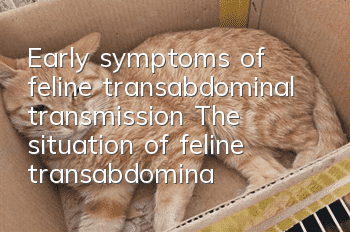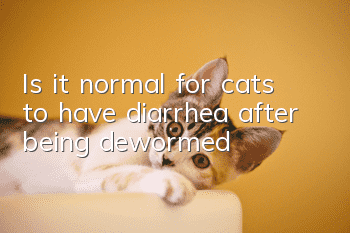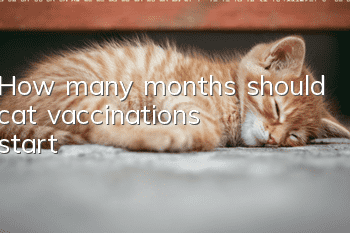Early symptoms of feline transabdominal transmission The situation of feline transabdominal transmission must not be ignored

The early symptoms of feline abdominal transmission are not very obvious. In the early stages, cats will have continuous fever, difficulty breathing, loss of appetite, and enlarged abdomen. Cat abdominal transmission mostly occurs in kittens under 1 year old, and is relatively rare in cats over 2 years old. Once the owner finds that the cat is listless, has loss of appetite, and has lost weight, he needs to pay more attention.
Early symptoms of feline abdominal transmission
The initial symptoms of abdominal transmission in cats are not obvious. They may have loss of appetite, poor energy, weight loss, and persistent fever. The body temperature continues to be between 39.5 and 40.6 degrees. It is higher at dusk and slowly decreases after nightfall. This This situation is a case of cat-borne transmission, and owners need to pay more attention and seek medical treatment promptly once discovered.
Common cases of cat transmission
1. Transabdominal transmission is most common in kittens under 1 year old, and is very rare in kittens over 2 years old.
2. Not all transabdominal cats have fever. Once fever occurs, it usually lasts for two or three days or recurs.
3. First consider common problems such as estrus, nasal congestion, and hairy bulb syndrome. If these common causes do not increase the risk factor.
How to judge whether a cat is pregnant or not
1. Most cats with abdominal distension will have ascites. When there is a lot of ascites, it can be clearly seen with the naked eye that the cat's belly is swollen and wider than the normal width of the body. You can feel the undulation of the water by touching it with your hands.
2. Note that a few cats will have pleural effusion but no ascites, and even fewer cats will have neither ascites nor pleural effusion, which is called dry abdominal transmission.
3. If the cat does not have ascites, you can continue to observe and look for other causes.
4. If the cat’s abdomen is obviously distended, please go to the hospital for examination immediately. The symptoms are suspected to be transmitted to the abdomen.
- What are the characteristics of feline hemobartonellosis? How to treat it?
- How to treat acute renal failure in cats? How to deal with renal failure in cats!
- What should you pay attention to when raising a cat in spring? Pay attention to preventing cat plague in spring
- How to touch a cat's bladder to see if it is bloated
- Can pregnant cats take nutritional supplements?
- What should you pay attention to when raising Scottish Fold cats?
- What does it mean when a cat rolls over his belly?
- When your cat behaves in the following 5 ways towards you, it means it doesn’t like you and may even hate you.
- Cat training strategy: How to train a cat to go to the toilet?
- How big are the average cheeks of an Isle of Man tailless cat?



